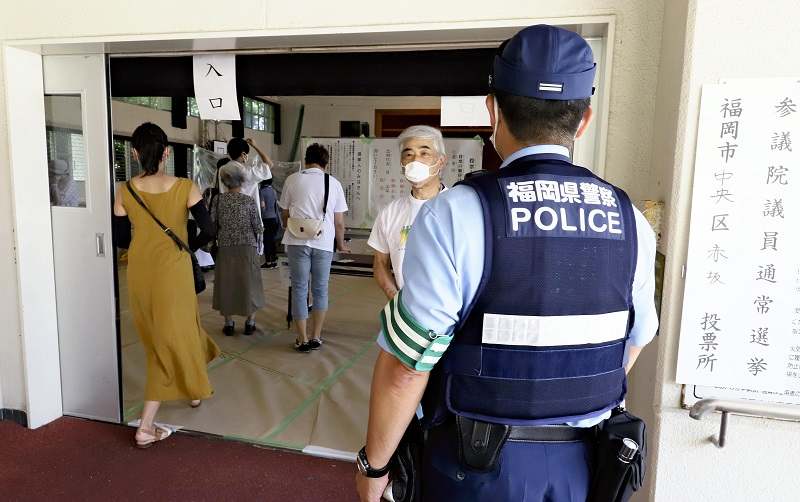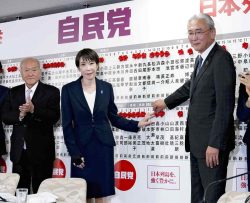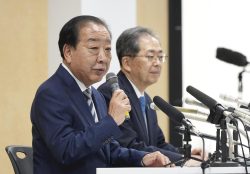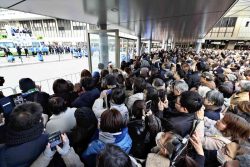
A police officer patrols at a polling station in Fukuoka City on Sunday.
16:17 JST, July 10, 2022
TOKYO (Jiji Press) — Voting is underway for Sunday’s House of Councillors election in Japan, with major issues in the poll including measures to deal with soaring prices as well as national security.
Balloting started at 7 a.m. at about 46,000 polling stations across the country. Voter turnout as of 2 p.m. stood at 18.79%, up 0.77 percentage point from the previous 2019 election for the upper chamber of the Diet, Japan’s parliament, according to the internal affairs ministry.
Up for grabs are 124 seats—74 for prefectural constituencies and 50 for the nationwide proportional representation system—plus one seat to fill a vacancy in Kanagawa Prefecture, eastern Japan. The focus in the Upper House poll is whether the ruling Liberal Democratic Party and its coalition partner, Komeito, can together win 63 seats, a majority of the 125 seats.
Voting is set to close at 8 p.m. except in some areas. Vote counting will begin immediately, with results seen becoming available late Sunday night.
The triennial election has been closely watched as a test for policies of the administration of Prime Minister and LDP President Fumio Kishida. It is the first major parliamentary election since the general election for the House of Representatives, the all-important lower chamber of the Diet, in late October 2021, shortly after Kishida took office early that month.
During the campaign period until Saturday, leaders and other officials of the ruling and opposition parties had intensive discussions on issues including measures to fight soaring prices blamed on Russia’s invasion of Ukraine and whether to review Japan’s national security policy.
Attention is also being paid to whether voting behavior in the Upper House election will be influenced by the shooting and death of former Prime Minister Shinzo Abe on Friday.
A total of 545 people ran in the election—367 in prefectural constituencies and 178 under the proportional representation system.
The total number of Upper House seats has been increased by three to 248. Kishida has set a target of winning at least 55 seats, the minimum necessary number for the ruling bloc, which has 70 uncontested seats, to maintain its majority in the upper chamber.
If the LDP, Komeito and two opposition parties positive on amending the Constitution—Nippon Ishin no Kai (Japan Innovation Party) and the Democratic Party for the People—win a total of 82 seats, the pro-reform camp would secure 166 seats, or a two-thirds majority in the Upper House including seats uncontested in Sunday’s election, meeting the condition for the chamber to propose amendments to the supreme law.
The outcomes in 32 constituencies where only one seat each is up for grabs are also being watched closely. Opposition parties were able to unify their candidates in only 11 of the 32 constituencies.
Each Upper House member has a term of six years. An Upper House election takes place every three years, with half of all seats in the chamber contested in each election.
Top Articles in Politics
-

Japan PM Takaichi’s Cabinet Resigns en Masse
-

Sanae Takaichi Elected 105th Prime Minister of Japan; Keeps All Cabinet Appointees from Previous Term
-

Japan’s Govt to Submit Road Map for Growth Strategy in March, PM Takaichi to Announce in Upcoming Policy Speech
-

LDP Wins Historic Landslide Victory
-

LDP Wins Landslide Victory, Secures Single-party Majority; Ruling Coalition with JIP Poised to Secure Over 300 seats (UPDATE 1)
JN ACCESS RANKING
-

Japan PM Takaichi’s Cabinet Resigns en Masse
-

Japan Institute to Use Domestic Commercial Optical Lattice Clock to Set Japan Standard Time
-

Israeli Ambassador to Japan Speaks about Japan’s Role in the Reconstruction of Gaza
-

Man Infected with Measles May Have Come in Contact with Many People in Tokyo, Went to Store, Restaurant Around When Symptoms Emerged
-

Man Infected with Measles Reportedly Dined at Restaurant in Tokyo Station





















